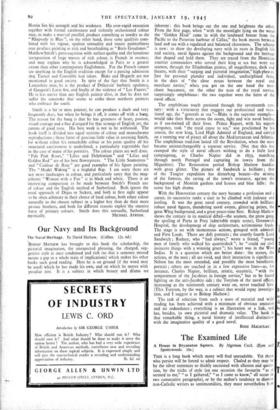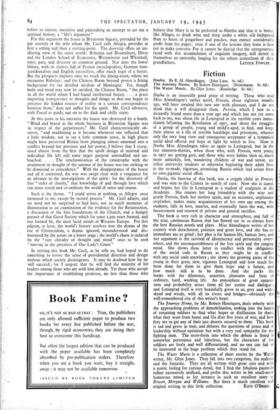The Examined Life
THIS is a long book which many will find unreadable. Yet those who persist will be forced to admit respect. Chafed as they may be by the silver sentences so thickly encrusted with allusion and quota- tion, by the tricks of style (on one occasion the favourite "as it seemed to me," " as I gathered," " as I came to know," all occur in two consecutive paragraphs), or by the author's tendency to dismiss non-Catholic writers as sentimentalists, they must nevertheless bsw
before so sincere, senstitive and painstaking an attempt to set out a
spiritual history, a "life's argument." • For this argument the house in Bryanston Square, pervaded by the gay serenity of the wife whom Mr. Cecil calls Allegra, provides at first a setting and then a starting-point. The doorstep offers an un- alluring view of the outer world: Bohemia and Bloomsbury, Dives and the London School of Economics, Westminster and Whitehall, meet, pass, and discover no common ground. Nor does the lower library, with its shelves full of French encyclopedists, German tran- scendentalists- and English rationalists, offer much hope of a better. But the prospects improve once we reach the dining-room, where we • encounter Rabelais ; and the Chinese Room beyond proves a fitting background for the distilled wisdom of Montaigne. Yet, though body and mind may now be satisfied, the Chinese Room, " the place in all the world where I had found intellectual beauty . . . a grace imparting transparency to thoughts and things so that one began to perceive the hidden essence of reality in a certain correspondence between them," does not suffice for the spirit. Mr. Cecil advances, with Pascal as guide, out on to the dark and chilly stairs.
At this point in his narrative the house was destroyed by a bomb. " Blind and brutal as the whole business in Bryanston Square was in respect of the perpetrators," Mr. Cecil characteristically ob- serves, " and maddening as it became whenever one reflected that a little wisdom, not to say a little common sense, in high places might have preserved Britain from plunging almost unarmed into a conflict beyond her province and her power, I believe that I recog- nised almost from the first that the spoilt design of national and individual life left still some larger purpose untroubled and un- 'touched. . . . The synchronisation of the catastrophe with the attainment in thought of the summit of the house was too striking to be dismissed as coincidence." With the disappearance of the house and all it contained, the way was swept clear with a vengeance for an advance to the investigations of the spirit: for the- discovery of that "order of charity," that knowledge of and through love which can alone reveal and co-ordinate the world of sense and reason.
Such is the theme. " I could arrive at nothing, as Allegra once intimated to me, except by mental process." Mr. Cecil admits, and we need not be surprised to find here, not so much moments of illumination as an examination of the evidence for the Resurrection, a discussion of the first foundations of the Church, and a hungry pursuit of that Great Society which for some 1,500 years formed, and was formed by, the most lucid minds of Western Europe. For this pilgrim, at least, the world's history resolves into the drama of the rise of Christendom, a drama ignored, misunderstood and dis- honoured by the actors on a lower stage • the.world's chaos is ordered by the " rare chivalry of thought and mind " once to be seen "moving in the precincts of Our Lady's Court."
In writing this book Mi. Cecil, as he tells us, had hoped to do something to revive the sense of providential direction and design without which society disintegrates. It may be doubted how far he will succeed ; for I suspect that he will find the majority of his readers among those who are with him already. Yet those who accept the importance of establishing premises, no less than those who believe that Mary is to be preferred to Martha and that it is better, like Allegra, to drink wine and sleep under a white silk bedspread than to boast of gingerbeer and patches, may, extract considerable profit from his pages: even if one of the lessons they learn is how not to make converts. For it cannot be denied that the unregenerate, faced with this accumulation of exquisite imagery, will detect in themselves an unworthy longing for the robust iconoclasm of their



























 Previous page
Previous page